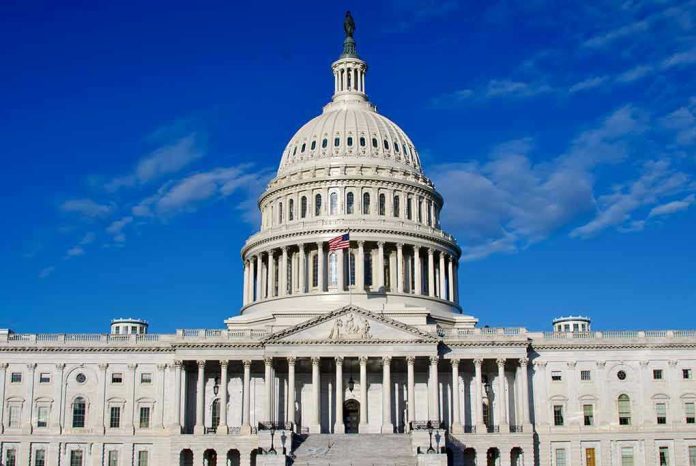
Troop paychecks and government services hang in the balance, exposing an uneasy truth about political brinkmanship in Washington—who really gets protected when the government shuts down?
Story Snapshot
- Senate Democrats blocked a Republican bill guaranteeing pay for active-duty military and essential federal workers during the ongoing shutdown.
- The shutdown has stretched 23 days, leaving thousands of workers in financial limbo and amplifying partisan divides.
- Democrats argue procedural priorities and broader negotiations outweigh piecemeal fixes, while Republicans frame the move as abandonment of critical workers.
- Public reaction intensifies, with social media amplifying voices of affected families, raising questions of duty, fairness, and political calculation.
Senate Showdown: Troop Pay Caught in the Crossfire
Republican senators introduced legislation to shield active-duty military and essential federal employees from the financial fallout of the government shutdown, seeking to guarantee uninterrupted pay. On Thursday, Senate Democrats blocked the bill, sparking a fierce debate on Capitol Hill. The shutdown, now entering its fourth week, has left thousands of military families and federal workers uncertain about their next paycheck. The move by Democrats is rooted in a broader strategic approach to budget negotiations, prioritizing comprehensive solutions over targeted relief.
The Republican proposal sought to create a stopgap, ensuring that those in uniform—and others keeping critical services running—would not bear the brunt of the gridlock. Democrats, however, insisted that passing isolated funding bills undermines the leverage needed to negotiate a long-term, bipartisan budget agreement. The party’s leadership argues that piecemeal solutions erode the urgency for a full reopening of government and could weaken negotiating power on other issues, such as funding for social programs and border security.
Political Calculations and Public Perception
Blocking troop pay during a government shutdown is a deeply symbolic move, fueling accusations from conservative commentators that Democrats have abandoned those who serve the country and keep society functioning. Republican leaders quickly seized on the optics, framing the vote as a moral failing and a betrayal of American values of duty and honor. Democratic senators counter by highlighting the need for structural fiscal responsibility, suggesting that short-term patches only postpone the inevitable reckoning with broader budgetary challenges.
This political tug-of-war is not new, but the stakes feel personal for the families of active-duty service members and federal employees. Many are now sharing their anxieties and frustrations across social media, amplifying stories of missed mortgage payments, stalled deployments, and the everyday uncertainty wrought by Washington’s impasse. The shutdown’s length—23 days and counting—only intensifies the emotional resonance, as each week brings new hardships for those caught in the crossfire.
Truly unbelievable that Senate Democrats blocked a bill to guarantee pay for our troops and essential federal workers during the shutdown. They are using this shutdown as leverage, and real people are paying for it. pic.twitter.com/42yvCLbVP8
— Rep. Stephanie Bice (@RepBice) October 24, 2025
Common Sense, Conservative Values, and the American Social Contract
American conservative values typically place a premium on the nation’s military and the essential workers who keep the engine of government running. Many conservatives argue that the refusal to guarantee pay for these groups violates the implicit social contract—those who serve and sacrifice should not become pawns in political gamesmanship. From this perspective, Democrats’ procedural objections ring hollow when weighed against the immediate needs of those defending the country or providing critical services.
Democrats defend their position by arguing that a patchwork approach to spending undermines fiscal discipline and the ability to negotiate comprehensive reforms. However, critics point out that withholding pay from troops and essential workers risks alienating a broad swath of the electorate, especially among older Americans who remember previous shutdowns and appreciate the tangible consequences of partisan gridlock. The debate thus becomes a referendum on the priorities and principles of both parties, with the public left to judge whether procedural purity outweighs the obligation to those in uniform.
Sources:
Senate rejects pay plan for some federal workers









